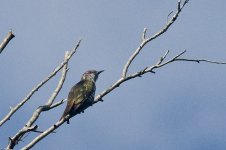punkskaphil
Well-known member
Hello everyone. Going through photos of some of the trips I've been on in the last few years, I came across this Bronze-cuckoo. It was taken in Port Douglas, Queensland, in September 2009 and the birding guide who was with me at the time said it was a Gould's. At the time he was preoccupied in trying to find a Frogmouth so didn't really pay much attention to it, and reading a book soon after the trip it suggested it could be something else (for the life of me, I can't remember right now what it did suggest).
I am inclined to trust him because he's a very experienced pro (and I'm a very inexperienced amateur), but if anybody else could confirm Gould's or something else, I'd be very grateful. Thanks.
I am inclined to trust him because he's a very experienced pro (and I'm a very inexperienced amateur), but if anybody else could confirm Gould's or something else, I'd be very grateful. Thanks.





